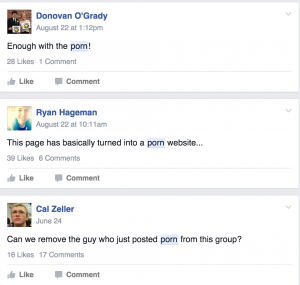By Beau Bowman
[email protected]
University social-media pages are home to posts of scenic portraits of campus life, congratulations to students who have recently been accepted to college, and in recent weeks, spam pornography posted by hackers.
As part of its social-media campaign, the UI has created Facebook groups for incoming freshmen to ask other freshmen common questions about college. The group is private — only students who are part of the group can see its content.
On the evening of Aug. 26, the UI Class of 2019 Facebook group was spammed with pornography by an outside account let in by another student.
On Aug. 26, the pornography could be seen on the page for almost four hours.
The UI Admissions Office, which declined to comment, sets up the Facebook group every year.
“I was so shocked, but I figured it must have been spam,” said UI freshman Sophia Valbuena.
UI officials said they keep security a top priority when dealing with social media.
“From creating strong passwords that we change on a consistent basis to limiting the number of people with access, we’re constantly working to enhance the security of our accounts,” said UI strategic communication writer Anne Bassett.
The University of Michigan’s football, basketball, and athletics Facebook pages were hacked earlier this month, and pornography was posted throughout the accounts.
In April, Iowa State University encountered a much more dangerous situation. Its servers, which contained more than 30,000 Social Security numbers, were compromised, along with the information of almost 20,000 student IDs. There was no evidence data files were accessed.
Iowa State then purchased one year of credit monitoring for those with exposed Social Security numbers.
But social media are a necessity for universities, one UI professor said.
“When students, prospective students, parents, alumni, and members of the Iowa community engage with the university on social media, this creates and builds relationships that are crucial to the success of the university,” said UI journalism Assistant Professor Brian Ekdale. “Plus, for most current and prospective students, social media are their home turf. Why wouldn’t the university want to be there?”




